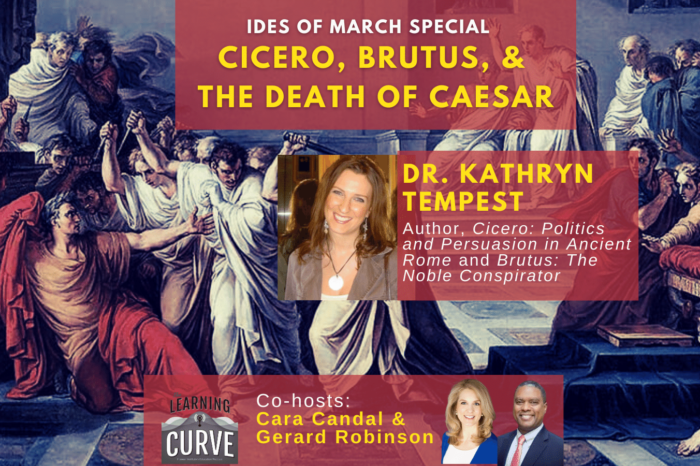UK Classics Scholar Kathryn Tempest on Cicero, Brutus, & the Death of Caesar
This week on “The Learning Curve,” Gerard and Cara talk with Dr. Kathryn Tempest, a Reader in Classics and Ancient History at the University of Roehampton in London, UK, and author of Cicero: Politics and Persuasion in Ancient Rome and Brutus: The Noble Conspirator. They discuss the historical, civic, and moral lessons political leaders, educators, and schoolchildren today can learn by studying the Roman Republic and the lives of key figures from that era such as Cicero and Brutus. Dr. Tempest reviews the legacy of Cicero, the distinguished statesman and orator, whose timeless works, influenced by Greek philosophy, have endeared him to extraordinary leaders through the ages, from St. Augustine to Churchill. She contrasts Cicero’s adherence to limited constitutionalism with the worldview of his nemesis, the colossal dictator Julius Caesar. She also delves into the complex relationship between Caesar and the enigmatic Brutus, whom Shakespeare called “the noblest Roman of them all” for his role in Caesar’s assassination on the “Ides of March.” Dr. Tempest traces the influence of these events on Enlightenment thinkers, including Locke and Montesquieu, and concepts such as the mixed constitution and separation of powers that are so fundamental to the American founding. She concludes with a reading from her biography of Brutus.
Stories of the Week: The latest COVID stimulus package comes with strings attached that could limit states’ ability to start or expand tax credit scholarship programs that help students attend private schools. A new report finds that nearly 40 percent of K-12 education employees have considered changing jobs out of fear of COVID exposure.
Guest:
 Dr. Kathryn Tempest is a Reader in Classics and Ancient History at the University of Roehampton in London, UK. She specializes in the literature, history, and political life of the late Roman republic. She is the author of two books: Cicero: Politics and Persuasion in Ancient Rome (Continuum 2011; reprint Bloomsbury 2013) and Brutus: The Noble Conspirator (Yale University Press, 2017), which won the Outstanding Academic Title for 2018 award sponsored by Choice.
Dr. Kathryn Tempest is a Reader in Classics and Ancient History at the University of Roehampton in London, UK. She specializes in the literature, history, and political life of the late Roman republic. She is the author of two books: Cicero: Politics and Persuasion in Ancient Rome (Continuum 2011; reprint Bloomsbury 2013) and Brutus: The Noble Conspirator (Yale University Press, 2017), which won the Outstanding Academic Title for 2018 award sponsored by Choice.
The next episode will air on Wednesday, March 24th, 2021 at 12 pm ET with guest, Dr. Eric Hanushek, the Paul and Jean Hanna Senior Fellow at Stanford University’s Hoover Institution.
Tweet of the Week:
See what the huge COVID-19 aid deal Biden has signed means for education, in two charts: https://t.co/Ntinz8LhkN pic.twitter.com/CJ0iMLNJsa
— Education Week (@educationweek) March 15, 2021
News Links:
WSJ e-board (edu tax credits): “Democrats to States: No New Tax Cuts”
https://www.wsj.com/articles/democrats-to-states-no-new-tax-cuts-11615333751?st=dznzwkiu6vpyi5p&reflink=article_email_share
Many Stressed K-12 Education Workers Consider Changing Jobs
https://www.governing.com/now/Many-Stressed-K-12-Education-Workers-Consider-Changing-Jobs.html
Get Updates on Our Education Research
Related Content















